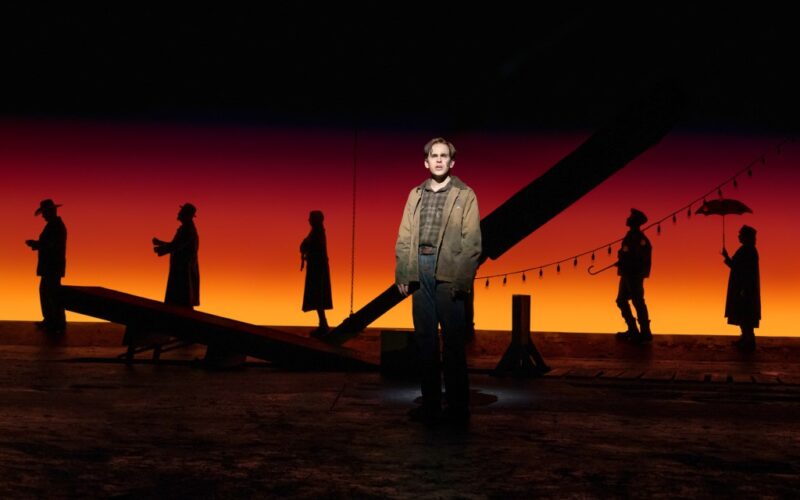In the first moments of Tina Landau and Adam Guettel’s “Floyd Collins,” the spring musical at Lincoln Center Theater set in the Mammoth Cave region of Kentucky in 1925, the titular impoverished Kentucky spelunker slithers his way down a particularly interesting opening here in the aptly named Barren County, hoping it unlocks his future fortune.
Rocks tumble. A ceiling gives way.
Floyd Collins, a real-life guy but now played here by the Broadway star Jeremy Jordan, gets stuck underground in the pitch black.
The rest of the show, which I first reviewed at Chicago’s Goodman Theatre back in 1999, is dedicated to the various attempts to pull him out.
It becomes a circus, of course, with various parties fighting for credit and against blame, media competing for the best story, hawkers selling their wares, bosses and workers fighting even as family members sit forlorn on the surface, desperate for news. Meanwhile, Floyd Collins keeps company mostly with crickets, but also with his brother Homer (Jason Gotay) and a reporter named Skeets Miller (Taylor Trensch), who possess the highly unusual but helpful journalistic quality of being short, thin and pliable enough to search for his scoops under the surface of the Earth.
I’ve been fond of this piece these last 25 years, shudder, not least because of the gorgeous melodies Guettel forged with this guitar-heavy score, the one and only example of this gifted composer’s foray into bluegrass and country, banjos and harmonicas put into service. Much of the music is very beautiful, including the aria-like solo called “The Call,” a lovely ballad called “Through the Mountain,’ sung by Floyd’s sister, Nellie (Lizzy McAlpine in a stellar Broadway debut) and a very sweet aspirational Floyd number called “And She’d Have Blue Eyes,” which I love.
Guettel wrote “Floyd Collins” not so long before his masterpiece “The Light in the Piazza” and, taken together, the two musicals reveal a composer of astonishing range, capable of giving musical voice to entirely different communities with equal vivacity and commitment.
So why did “Floyd Collins” not feel fully satisfying in this new staging from the original director and book writer?
Part of the problem is baked into the material and was present back in the 1990s. You might think of it as the immobile protagonist dilemma: It’s not easy to center a musical around a man who for almost all of the show is incapable of movement.
“Floyd Collins” is not the first musical to set itself that problem: “Hands on a Hardbody,” an underrated show about contestants who had to keep their mitts on an automobile, struggled with the same issue. But the first time around with “Floyd Collins,” if memory serves, Landau better managed to center Floyd and thus help him to win over our empathy. This time, naturally with a different actor, that doesn’t work as well — a consequence, I think, of Lincoln Center’s massive stage and Landau’s understandable reluctance to just stick the guy in the middle of the stage.
Off to the side, though, and far away from many folks watching, it’s just tough for him to command the necessary level of attention, notwithstanding Jordan’s famous vocal chops. The other central characters fare better, especially Gotay’s moving Homer and Miller’s spunky scribe, but also McAlpine and Mark Kudisch as Floyd’s dad. But Sean Allen Krill, who plays the designated evil suit, has to deal with an archetype. And the reporters, too, are mostly just types, even though Guettel wrote them a fabulous satirical number called “Is That Remarkable.”

In this new design by the team known collectively as dot, you don’t so much see the real hills of Kentucky as a kind of surreal dreamscape that looks cool in an arty kind of way, but still doesn’t truly connect you to Floyd himself. Even Floyd’s final number, “How Glory Goes,” which I remember as hitting you between the eyes, just does not soar.
Sure, this show is about more than Floyd Collins. It has much to say about how America exploits human and familiar tragedy, then and now, but it just cannot work fully without a deep connection taking place between the audience and the main character.
Jordan’s Collins feels more reactive than proactive, even though I think Landau and Guettel intended him as a great American adventurer, a striving risk-taker who deserved a community and a country that had his back. Simply put, the emotional waves that all musicals need to surf in order to fully work just seem here to stop at the surface. We understand the issues, but don’t feel all the feels underground.








